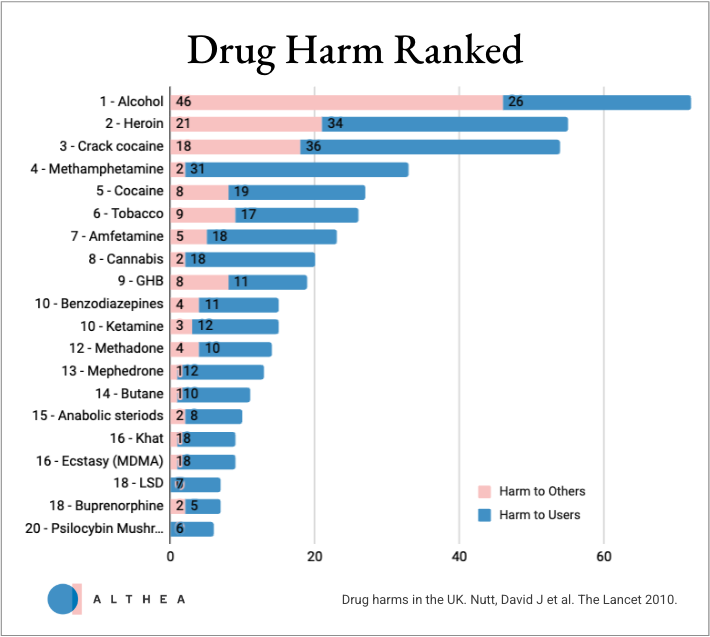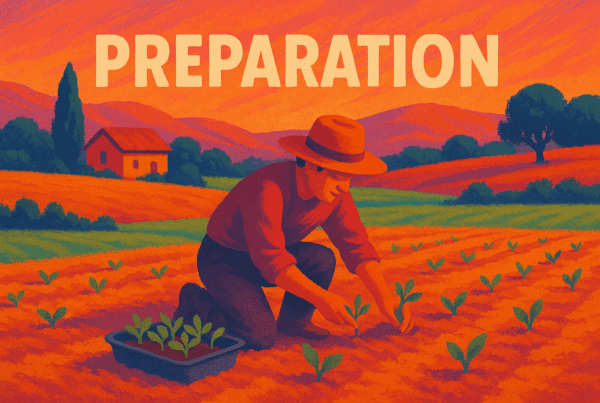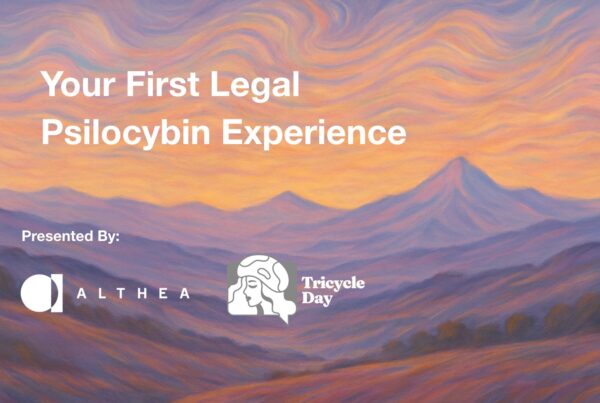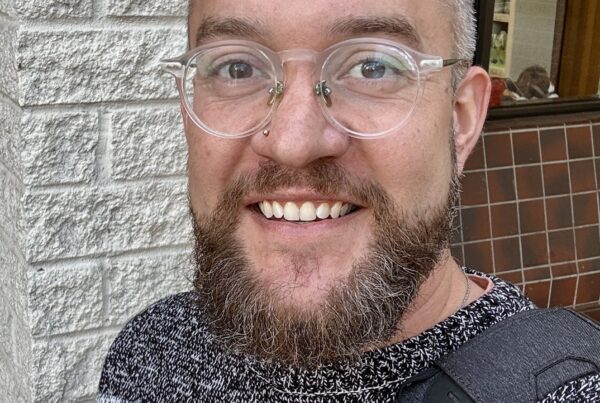
David Nutt was the chairman of the UK’s Advisory Council on the Misuse of Drugs. Beyond being a renowned researcher, neuropsychopharmacologist, and director of the Centre for Psychedelic Research at Imperial College London, his job at the time was to advise the British government on the potential harms of various compounds.
In 2010 he published a paper in The Lancet that ranked the harm done to users and British society by a range of drugs. This was based upon a quantitative multiple-criteria decision analysis. The results are as follows:
While the list is fascinating, we bring it up here to note that psilocybin ranked last out of the 20 drugs indexed. It scored a 0 in its potential harm to others, while scoring a 6 in its potential harm to users, for a total score of 6 out of 100 harm index. However, there are still significant risks which earned it that score. Understanding the potential dangers is crucial for mitigation when considering its use.
Can you overdose on psilocybin? The short answer is “no.” Psilocybin has low physiological toxicity, abuse potential, and addictive liability. There are reports of psilocybin overdose, but these are often due to cardiac arrest, which we’ll discuss more below. There is no standard value for a lethal dose in humans.
Risks associated with psilocybin can be prevented or alleviated within a supervised setting, with preparatory counseling to induce the right mindset, and with adequate professional psychological and physiological support.
Psychological Risks
One of the most well-known dangers of psilocybin is the potential for psychological distress. The substance alters perception, mood, and cognition, which can lead to intense and sometimes overwhelming experiences. Users may encounter:
- Bad Trips: Hallucinations and altered perceptions can become terrifying, leading to paranoia, fear, or a sense of losing control. These experiences can be distressing and, in some cases, lead to lasting psychological effects.
-
Exacerbation of psychiatric conditions: Psilocybin can exacerbate existing psychotic disorders such as schizophrenia. Individuals with a personal or family history of psychosis or bipolar disorder should avoid psilocybin.
-
Hallucinogen Persisting Perception Disorder (HPPD): Though rare, HPPD is a clinically significant complication that manifests as chronic perceptual changes that can interfere with daily functioning.
-
Other Adverse Reactions: Clinical studies have shown that adverse reactions to psilocybin can include anxiety and confusion.
Physical Risks
Although psilocybin is not considered physiologically toxic, it can still lead to adverse physical effects, such as:
- Nausea and Vomiting: Ingesting psychedelic mushrooms can cause gastrointestinal distress, leading to nausea, vomiting, or stomach cramps.
- Increased Heart Rate and Blood Pressure: Psilocybin can cause a temporary spike in heart rate and blood pressure, which may be dangerous for individuals with cardiovascular conditions.
- Risk of Poisoning: Mistaking toxic mushrooms for psilocybin-containing ones can lead to serious poisoning or even death.
- Drug contamination: Psychedelic drugs may be contaminated with dangerous substances.
Legal and Social Consequences
In many parts of the world, including most of the US, psilocybin remains illegal, and possession or use can lead to legal consequences. Oregon and Colorado are the exceptions to this and have regulated programs that allow people over the age of 21 to use psilocybin under the direct supervision of licensed facilitators. In these articles, we go into more detail on its legal status along with how these programs work.
Additionally, individuals who use psilocybin in uncontrolled settings may engage in risky behaviors or struggle with integrating their experiences into daily life.
Safe Use Considerations
For those who choose to use psilocybin, harm reduction strategies can help mitigate risks:
- Mindset: Your mindset going into a psilocybin experience is vitally important. Facilitators work with clients to mentally and emotionally prepare for what may come up. This article goes deep on what to look for in a facilitator.
- Setting: Being in a safe, comfortable environment with trusted individuals can help prevent negative experiences. In state regulated programs, centers are licensed as safe and appropriate places to work with psilocybin under the supervision of a licensed professional.
- Dosage Awareness: Taking a lower dose can reduce the likelihood of overwhelming effects. Psilocybin is often consumed in the form of whole, dried mushrooms. The actual psilocybin content may vary wildly, depending on the methods of production and strain. In regulated programs, mushrooms are lab tested for potency and purity. Additionally, your facilitator will work with you to determine an appropriate dose to start with, along with the potential to increase dosage during your session, based on how you’re feeling.
- Mushroom Preparation: To help mitigate the potential nausea that some experience, mushrooms are often prepared in a tea with lemon and/or ginger. This can help breakdown the mushrooms into the active ingredient, psilocin, without contributing to an upset stomach. Additionally, extracted psilocybin or psilocin products are being developed for use in the regulated market. However, there are many retailers who claim to sell mushroom products like gummies or chocolates that aren’t tested. One should use caution in working with these black market suppliers – there is currently no legal retail market for psilocybin in the United States.
- Medical and Psychological Screening: It is best practice to screen individuals considering taking psilocybin. Althea worked with the University of Colorado School of Medicine’s Department of Psychiatry to develop a comprehensive medical and psychiatric screening instrument that is available to any facilitator using our platform.
While psilocybin holds promise for so many, its risks should not be overlooked. Psychological distress, physical side effects, and legal implications make it a substance that requires careful consideration. Education and responsible use are essential for minimizing potential harm and ensuring a safer experience.
If you’re considering using psilocybin for any reason, we would encourage you to speak with us. The best first step is to complete the form below. We will keep your information private and get back to you as appropriate, based on your answers.




